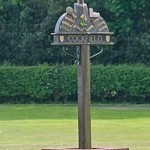On Saturday June 21st the professional theatre company, Rain or Shine, will perform “Treasure Island” by Robert Louis Stevenson in Cockfield School field (or village hall if wet). Robert Louis Stevenson loved Cockfield.

“O that is a day that I shall never forget; nor the day before; nor so many other beautiful days at Cockfield. And they cannot be taken from me; they, nor their influence.” RLS to Fanny Sitwell 1873.
Robert Louis Stevenson was almost 20 when he first came to stay at Cockfield Rectory on 30th September 1870, to attend his cousin, Jane Wilson’s, wedding to the Rev. Carleton Greene in St Edmundsbury Cathedral.
He came again in July 1873 and stayed until October – a visit he described as “very fortunate” because of the people he met and the influence they had on his life. Details of these visits are recorded in his letters to his mother in Edinburgh, and to his friends, and in the writings of those he met. They give a brief glimpse of leisurely life at the Rectory 140 years ago and of village life. He composed his first published essay while staying here and it has been suggested that the seeds of his novel “Treasure Island,” first published in a periodical in1881, were sown here, when he walked in the garden with a young fellow guest and enjoyed the ornamental moat with two islands that had been recently restored.
Robert Louis Stevenson’s cousin, Maud, had married the wealthy Churchill Babington, a Cambridge professor of archaeology and Rector of Cockfield from 1866 – 1889.
On RLS’s first visit on October 3rd 1870 he wrote from Cockfield Rectory to his mother:
“There is no village of Cockfield but a number of delightful hamlets, each round its little patch of green: there is Great Green, Parsons Green, Windsor Green, Old Hall Green, Cross Green, and others.
Yesterday we had a service in the barn, the church being under restoration; afterwards I set forth and walked through the fields to Bradfield Combust, an old village, with a church, store of antique cottages and a most beautiful avenue of elms.
We breakfast at half past eight. Then Grahame [Balfour, another cousin] and I smoke a pipe in the garden. At one, we lunch. At half-past six dine, go into the drawing room for tea, and then return to the dining room for brandy and water, (or in my case, beer) not unaccompanied with pipes…. In the afternoon we went to a croquet party, where I enjoyed myself much, the people were frank and pleasant; the place (Clopton Hall) pretty.
Mr Babington is not so old as I expected, and is not at all disagreeable. Only one little disagreeable took place. I was carrying his footrest into the dining room and, in turning round to remind Grahame that he should give him his arm, I struck a little stand laden with china. The professor’s brow darkened. ‘If you upset that and break my Wedgwood’ said he ‘I shall not thank you very much.’ He and Maud get on well together.”
On October 6th he wrote again to his mother:
“The marriage went off exceedingly well, and the persons in question were sent off in triumph. After the marriage we all went back to Risbygate Street where we had refreshments and a photographer. All then came out to Cockfield where we had a luncheon and four croquet sets. The day including sixteen miles drive lasted from 7.30 to seven, and at the end of it the greater part of us felt as though the labours of Hercules were at last eclipsed. Yesterday Grahame and I walked over to Lavenham, a most delightful old town. Coming back we lost our way among the fields and had a sore trouble to extricate ourselves. One of the ditches took me over the head and I had to lie down on the far side and give Grahame a foot to struggle up by.”
About his next visit R L S wrote:
“My visit to England was to a country rectory, the house of a cousin of mine and her husband, the delightful Churchill Babington; I knew what I had to expect, croquet parties, the parsons’ wives, the ecclesiastical celebrations…” It turned out to be much, much better than that, although he did not think much of the Cockfield school children …..
To be continued








